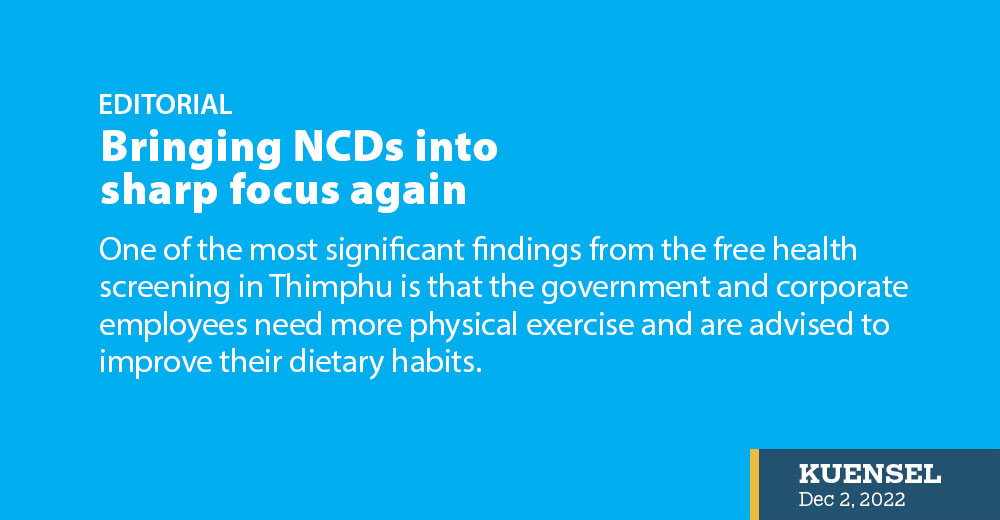One of the most significant findings from the free health screening in Thimphu is that the government and corporate employees need more physical exercise and are advised to improve their dietary habits.
Of the 2,088 employees screened until Tuesday, 331 were found to be living with at least one or more comorbidities. The screening included tests for non-communicable diseases (NCDs) such as hypertension, HIV and H. pylori, among others. Twenty-three percent had hypertension and 31 percent had signs of pre-hypertension; 48 percent were found to be overweight and 20 percent obese.
NCDs are a serious and growing problem and one of the biggest killers in the country today.
The endorsement of the implementation roadmap for prevention and control of NCDs in the region 2022–2030 by the member countries of the 75th session of the regional committee meeting of WHO South-East Asia Region (SEAR) in Paro in September this year so should receive a special focus.
The roadmap provides strategic directions to speed up the national NCD response through primary healthcare and universal health coverage to improve access, coverage and quality of NCD prevention and control interventions. At the meeting then, regional director, Dr Poonam Khetrapal Singh, said that the region must build on the progress made thus far in the prevention and control of non-communicable diseases. “Though trends are in the right direction, we need to accelerate efforts to achieve global, regional, and national goals.”
NCDs, including cardiovascular diseases, cancers, chronic respiratory disease and diabetes account for almost two-thirds of all deaths in the region, according to the WHO.
We cannot, therefore, overlook the dangers of NCDs—both in terms of human suffering and referral costs. Our lifestyles have changed dramatically over the years. Nearly half the deaths due to NCDs occur prematurely between the ages of 30 and 69 years.
The meeting in Paro called for the need to strengthen policy and legislative frameworks besides advancing primary health care, universal health coverage, human resources, accountability and quality of national health information systems. Data and information systems, at all levels, will play a crucial role to promote accountability.
As the resolution of that meeting noted, decisive leadership and political commitment have the potential to provide policy and legislative frameworks needed to integrate high-quality and comprehensive programmes in the country.
What we also know from the health screening, perhaps not sparingly, is that most Bhutanese, young and old, are into the habit of consuming alcohol and tobacco. Such habits, without sensible dietary routines and lack of physical exercise can give rise to detrimental consequences in people’s health.


